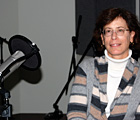Geology professor Connie Soja spent a month coping with howling hot winds and 100-degree temperatures in the Gobi Desert of Mongolia as her research team examined rocks dating back more than 400 million years.
Soja and her colleagues were hunting for clues to a tectonic puzzle: Where was that portion of southern Mongolia actually located that many million years ago and what might that tell us about the position of the continents back then?
Soja talks about her research in the latest of ş¬Đ߲ÝŃĐľżËů Conversations, the podcast that highlights members of the campus community.
This past summer’s trip to Mongolia was funded by the , a prestigious association of colleges that ş¬Đ߲ÝŃĐľżËů was invited to join in 2006, with additional support from the ş¬Đ߲ÝŃĐľżËů Geology Department and the university’s Research Council.
 |
| Geology professor Connie Soja was able to visit the area where Roy Chapman Andrews, who inspired the Indiana Jones movie character, discovered a dinosaur egg later donated to ş¬Đ߲ÝŃĐľżËů. |
Soja and other researchers examined fossils, the types of rocks in which they occur, and sedimentary minerals in a bid to better correlate that part of Mongolia to some part of the world, perhaps south China or eastern Europe.
Soja said the research also can be used to examine how specific environments and the organisms within them have changed over time and what role climate change might have played in that.
Adam Pellegrini ’10 was one of eight U.S. and four Mongolian students selected for the research expedition, which also included Paul Myrow, a 1980 ş¬Đ߲ÝŃĐľżËů graduate
who now is a geology professor at Colorado College.
During a side trip to Mongolia five years ago, Soja was able to plot out the Keck expedition and also visit the Flaming Cliffs, the site where ş¬Đ߲ÝŃĐľżËů’s famous dinosaur egg was discovered in 1923.
The 80-million-year-old specimen – one of the first dinosaur eggs ever discovered – was donated to the university a year later.
Soja has become the university’s resident expert about the egg, conducting numerous educational programs and writing about it for a cover story in American
Paleontologist magazine.
In the podcast, she discusses the egg’s colorful history and its new campus home in the , where it is on public display for the first time in decades.
Soja also discusses her interest in Charles Darwin, and how she came to know his great-great-grandson , whom she introduced to ş¬Đ߲ÝŃĐľżËů students studying abroad in England and through a special video conference.
To hear the full podcast interview, to listen now or right-click and “save target as” to download file. You also can go to the ş¬Đ߲ÝŃĐľżËů Conversations or iTunes for more download options.